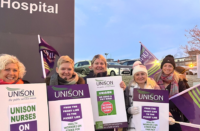On 30 January the Irish Congress of Trade Unions held a housing conference under the banner of “Raise the Roof.” The two main demands to come out of the conference were the need for public housing and for the right to housing to be enshrined in the Constitution of Ireland.
The conference was attended by a cross-section of activists, representing trade unions, communities, and housing, students’ and children’s groups, together with some academics.
Rebecca Keating of the Mercy Law Resource Centre outlined what would be required in a right to housing. The opinion was that this right should be enshrined in the Constitution as well as in legislation, otherwise it could be overturned by the Government. The wording would need to be very tight so as not to leave it open to reinterpretation.
This would go a long way towards putting some existing practices in the housing market outside the law. If the market was pushing the cost of housing beyond people’s ability to afford it, this could be challenged constitutionally. In this case it would not be profitable for the landlord class to continue with the orgy of its rackrenting of citizens. The state would have to become the main provider of housing for citizens. It would also limit the ability of financial institutions to evict tenants. This would further limit the interest of privateers in the housing market: if there is no room legally for excessive profits and exploitation, their reason for being disappears.
The demand for public housing was raised again and again, but the interpretation of what constitutes public housing seems to differ substantially from one speaker to the next, because they represent different interests. Lots of excuses have been raised for not building large-scale public housing—everything from lack of land to not enough builders, architects, etc., as well “not in my back yard” and ghettoisation, with some trying to tarnish what was a rare success of previous governments, the massive public house-building carried out from the 1930s to the 1960s.
It was counter-argued that there is no shortage of land, as the state controls 17 per cent of all land zoned for housing. And there is no shortage of expertise (builders, architects, etc.) when we see the high-rise student accommodation, as well as hotels and offices, being built by speculators, generating billions in profit for the elite.
To do away with ghettoisation, public housing needs to be universally accessible so as to guarantee mixed-income tenants. Proper facilities and infrastructure have to be built in conjunction with public housing; this is a mistake made in some instances in the past.
To cut costs, public housing has to be publicly built, instead of creating a gravy train for the private sector. Public land zoned for housing must be solely for public housing.
Some speakers continued to push for the “cost rental” model of public housing. They don’t seem to understand what they are talking about, referring to affordable rents of €600 per month when in reality the cost-rental model for St Michael’s Estate, for example, came in at about €1,500 a month. The cost-rental model is a cop-out by the state, putting the total cost and maintenance of the properties on the tenants in what is actually a permanent state asset, instead of the state paying for a public housing service available to all citizens at rents linked to income.
Nevertheless the conference is a good start to the debate on a solution to the housing crisis, which, it was agreed, is a result of the repeated failures of government policy. The citizen has nothing to lose and everything to gain; so it is essential that maximum effort is made by all to come up with a permanent, sustainable solution to the housing crisis and not to facilitate a temporary solution.
We need to transform housing for our citizens: universally accessible publicly built and publicly owned housing for all citizens as a constitutional right.
A number of regional marches were announced to launch the campaign, beginning in Cork in March, followed by one in Galway and culminating in a mass national housing demonstration in Dublin early in the summer.






